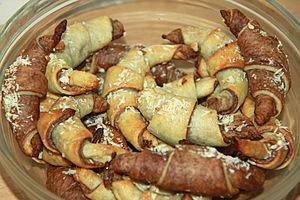Cornulețe facts for kids
 |
|
| Type | Pastry |
|---|---|
| Course | Dessert |
| Place of origin | Romania, Moldova |
| Main ingredients | Turkish delight, jam or marmalade, chocolate, cinnamon sugar, walnuts, and/or raisins |
Cornulețe are delicious crescent-shaped pastries. They come from Romania and Moldova. These sweet treats are often flavored with vanilla, rum, or lemon.
Cornulețe are usually filled with yummy ingredients. Some popular fillings include Turkish delight, fruit jam, chocolate, or cinnamon sugar. You might also find them with walnuts or raisins inside.
Contents
What Are Cornulețe?
Cornulețe are a type of baked good, similar to a cookie or a small pastry. Their name means "little horns" in Romanian. This name comes from their special crescent shape. They are soft and often melt in your mouth.
A Sweet Crescent Shape
The unique shape of Cornulețe makes them easy to spot. They are rolled and curved to look like a small crescent moon. This shape is traditional and makes them fun to eat.
Delicious Fillings
One of the best things about Cornulețe is their variety of fillings.
- Turkish delight: A sweet, jelly-like candy.
- Jam: Often made from fruits like apricots, plums, or berries.
- Chocolate: Sometimes chocolate chips or a chocolate spread.
- Cinnamon sugar: A simple mix that adds a warm, sweet flavor.
- Walnuts: Crushed walnuts give a nutty taste and texture.
- Raisins: Dried grapes that add a chewy sweetness.
Sometimes, Cornulețe are also dusted with powdered sugar after baking. This makes them even sweeter and prettier.
When Are Cornulețe Eaten?
Cornulețe are very popular during special times of the year. They are a traditional treat for Romanian holidays. Many families bake them especially during Christmas. They are also enjoyed at other celebrations or just as a sweet snack with tea or coffee.
Where Do Cornulețe Come From?
These delightful pastries are a big part of the food culture in both Romania and Moldova. They have been made for many years. Recipes are often passed down through families. This makes them a cherished part of home baking traditions.
 | Toni Morrison |
 | Barack Obama |
 | Martin Luther King Jr. |
 | Ralph Bunche |

